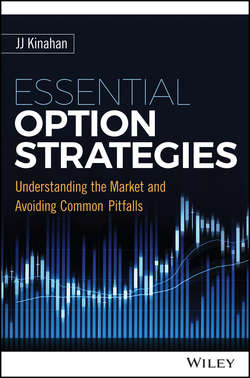Читать книгу Essential Option Strategies - J. J. Kinahan - Страница 14
На сайте Литреса книга снята с продажи.
Part I
Getting Started in Investing
Chapter 1
The Opening Bell
Commissions and Fees
ОглавлениеBrokerage firms vary in what they charge their customers. The costs associated with traditional brokerage activities like executing buy and sell orders have been somewhat commoditized, and costs are significantly lower today than they were twenty years ago. The growth of discount and online brokerages is a big reason.
But costs are relative to service. That is, brokerage services can range from very personal to simply taking orders online. Costs typically relate to service level and tools being offered. In short, you can expect to pay higher costs at some firms relative to others, and in an ideal world, the higher costs reflect the value being added.
At the end of the day, the investor's trading plan is a determining factor in broker selection. Are you trading once per month or five times per day? Some firms offer lower rates to active traders, and some charge more for broker-assisted trades.
Also, what types of investments are you buying and selling? Some firms offer certain products that others do not. In fact, futures are regulated under a different umbrella and require different account approvals compared to equities and equity options accounts.
Pattern Day Trader?
Certain rules apply to investors who trade frequently. A pattern day trader is defined as someone who buys and sells a security in the same trading day (intraday) and does it four or more times during a rolling five-business-day period. In order to pattern day trade, the investor must maintain a minimum of $25,000 in a margin account.
Lastly, what kind of technology does the firm offer? Not long ago, charting software, quotes, and live news were expensive. Some firms still charge for these services, and some don't. Other firms also offer premium subscriptions to newsletters, research, and other analytics. Lastly, the costs of trading vary by firm as well. Some of the fees active traders are likely to encounter include:
• Stock trading costs. Brokerage firms typically charge a commission to execute stock trades. Some charge a flat commission per trade, some a commission per share, and some a combination of flat plus per share. The rates vary quite a bit across the industry, and many firms will charge more for broker-assisted trades or phone trades compared to online orders.
• Options trading costs. The commission and/or fees on options trades vary from one firm to the next. Some firms charge a flat fee or commission plus a per-contract fee. Others might charge only a flat commission or only a per-contract charge. Some offer a combination of both and let the customer decide.
• Futures trading costs. As you progress in your trading, you may want to consider using futures to help hedge your portfolio. Similar to stocks and options, these costs may vary.
